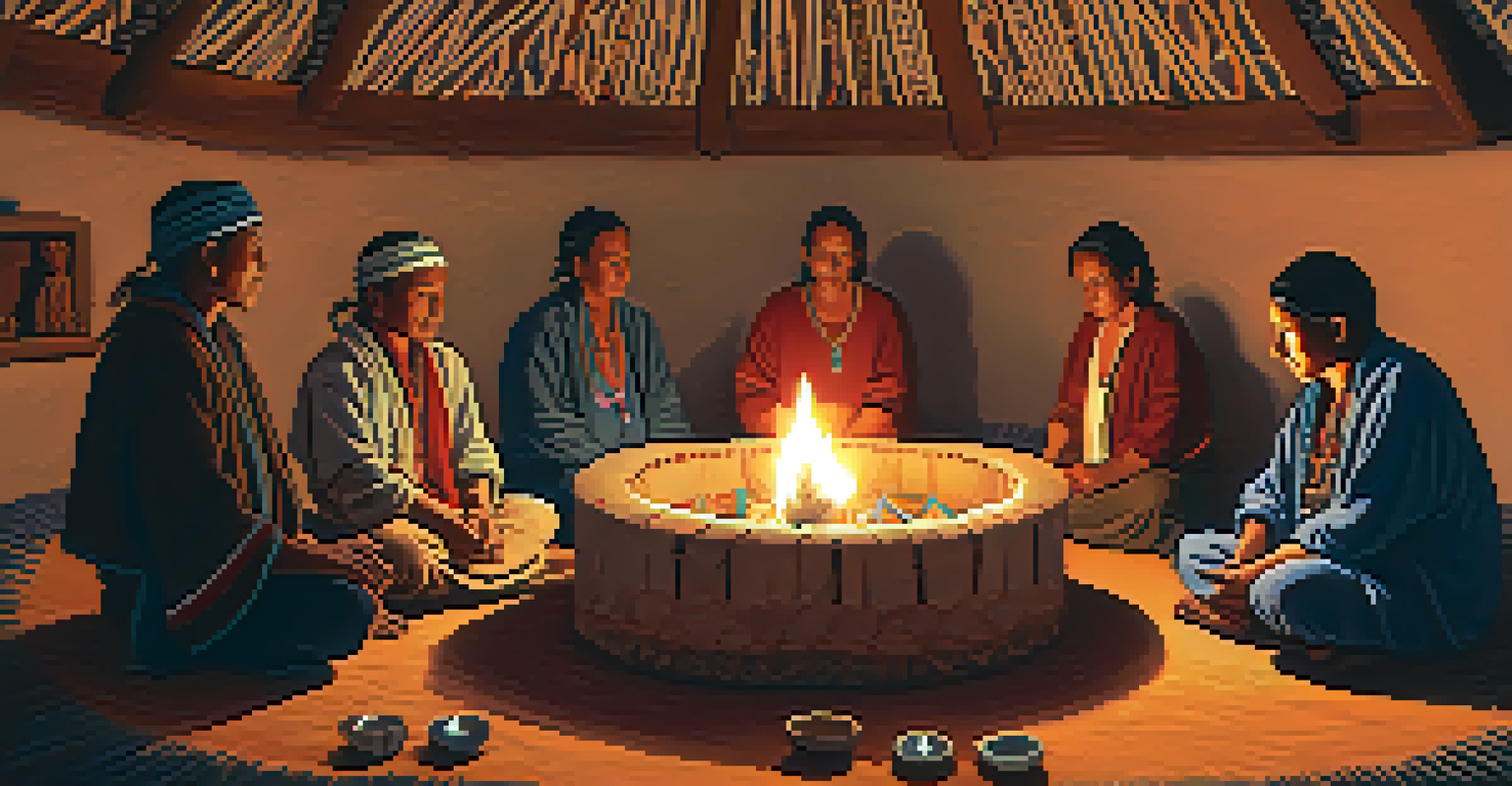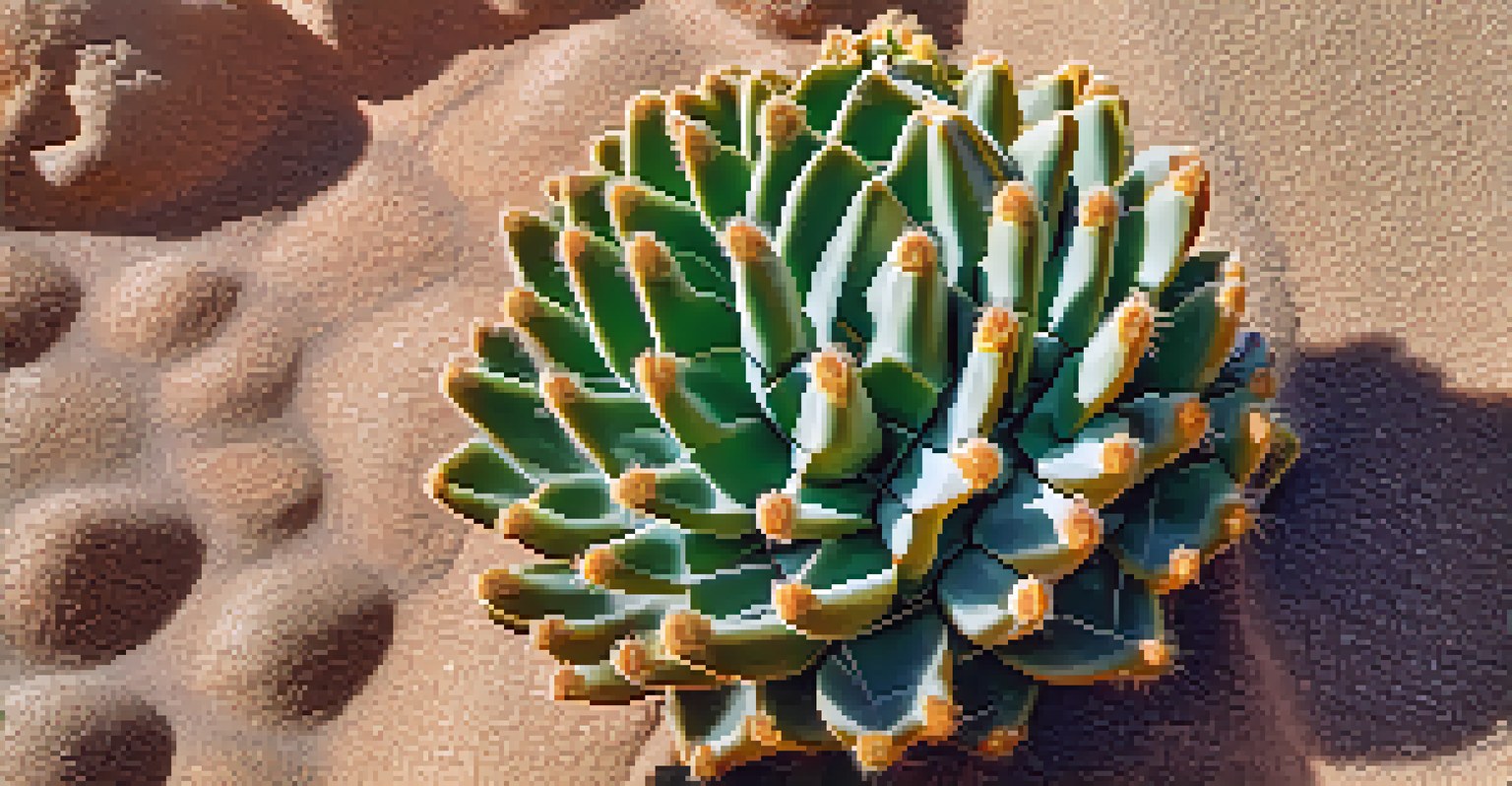Navigating Healing: Peyote in Indigenous Medicine Practices

Understanding Peyote: A Sacred Cactus in Indigenous Cultures
Peyote, a small spineless cactus native to Mexico and the southwestern United States, holds immense significance in various Indigenous cultures. For many, it is not merely a plant; it is a sacred entity that plays a vital role in spiritual and healing practices. Traditionally, it has been used in ceremonial contexts, allowing individuals to connect deeply with their spirituality and the universe around them.
It is through the experience of ceremony that we can reconnect with ourselves, our ancestors, and the universe.
The psychoactive compound in Peyote, mescaline, induces altered states of consciousness that many Indigenous people believe facilitate profound healing experiences. This aspect of Peyote distinguishes it from other medicinal plants, as its use is deeply intertwined with spiritual beliefs and community rituals. The ceremonies often involve singing, drumming, and sharing, creating a supportive environment for participants.
In essence, Peyote serves as both a physical and spiritual medicine. It is a bridge that connects the individual to their ancestors, nature, and the cosmos. This connection is a cornerstone of Indigenous healing practices, emphasizing the holistic approach that integrates mind, body, and spirit.
The Role of Rituals in Peyote Healing Practices
Rituals surrounding Peyote use are vital for creating a safe and sacred space for healing. These practices often take place in gatherings known as 'Peyote meetings' or 'sweat lodges,' where community members come together to partake in the medicine. The collective energy and intention of the group enhance the healing experience, fostering a sense of belonging and support.

During these rituals, participants engage in prayers and songs that honor the spirit of the Peyote cactus. This reverence helps set the tone for the healing journey, allowing individuals to explore their inner selves and confront personal challenges. The communal aspect of these rituals is essential, as it reinforces the idea that healing is not a solitary journey but a shared experience.
Peyote as Sacred Medicine
Peyote is not just a plant, but a sacred entity integral to Indigenous spiritual and healing practices.
Moreover, the rituals are often led by a knowledgeable guide or shaman who helps navigate the experience. This mentorship provides participants with the guidance they need to process their emotions and insights, ensuring a safe and meaningful journey through their healing.
Peyote's Impact on Mental Health and Well-Being
Many Indigenous people report significant improvements in their mental health after participating in Peyote ceremonies. The experiences can help individuals confront trauma, anxiety, and depression, leading to profound personal transformations. This therapeutic potential is recognized not just within Indigenous communities but is also gaining attention in broader mental health discussions.
Psychedelics can be a tool for healing, but they must be approached with respect and understanding of their cultural significance.
Research indicates that mescaline, the active component of Peyote, may promote neuroplasticity and emotional resilience. This means that individuals may be able to rewire their thought patterns and develop healthier coping mechanisms. The insights gained during these experiences often lead to a greater understanding of oneself and a renewed sense of purpose.
It's important to note that while Peyote can offer healing, it is not a one-size-fits-all solution. Many factors, including cultural context, personal beliefs, and individual circumstances, play a role in how each person experiences its effects. Therefore, engaging with Peyote should be approached thoughtfully and respectfully.
Cultural Significance: Peyote in Indigenous Identity
Peyote is more than a healing tool; it is a symbol of Indigenous identity and resilience. For many Native American tribes, its use is deeply rooted in tradition and cultural heritage, representing a connection to ancestral practices. This cultural significance reinforces the importance of preserving these practices in the face of modern challenges.
The ceremonies surrounding Peyote are often linked to stories of creation and survival, instilling a sense of pride and belonging among participants. This connection to one's culture can be particularly powerful for younger generations, helping them navigate their identity in a rapidly changing world. In this way, Peyote serves as a cultural anchor, grounding individuals in their history and community.
Rituals Enhance Healing Experiences
Community rituals surrounding Peyote use create a supportive environment that fosters collective healing and personal growth.
Moreover, the fight to protect the use of Peyote reflects broader struggles for Indigenous rights and sovereignty. Advocacy for the preservation of Peyote traditions is a vital part of reclaiming cultural heritage, emphasizing the need for respect and understanding from non-Indigenous communities.
Legal and Ethical Considerations in Peyote Use
The legal status of Peyote varies significantly across regions, often complicating its use outside of traditional contexts. In the United States, for example, the American Indian Religious Freedom Act allows recognized tribes to use Peyote for ceremonial purposes, but restrictions exist for non-Indigenous individuals. This legal framework underscores the importance of respecting Indigenous sovereignty and cultural practices.
Ethical considerations also arise when discussing Peyote use in non-Indigenous contexts. As interest in psychedelic therapy grows, it is crucial to acknowledge the cultural significance of Peyote and avoid appropriating Indigenous practices. Engaging with these traditions should be done with respect, understanding, and ideally, guidance from Indigenous leaders.
Ultimately, navigating the complexities of Peyote use requires a thoughtful approach that honors its cultural roots. Non-Indigenous individuals interested in Peyote must educate themselves about its significance and the ethical implications of their involvement.
Personal Experiences: Testimonials from Peyote Users
Personal stories from individuals who have participated in Peyote ceremonies often highlight the transformative power of these experiences. Many describe feelings of deep connection to nature and a profound understanding of their place in the universe. These testimonials illustrate that Peyote can facilitate healing journeys that extend beyond mere physical or mental health improvements.
Participants often report experiencing clarity of thought and a renewed sense of purpose after their Peyote journeys. For some, these experiences have helped reconcile past traumas or foster a deeper appreciation for life. Such stories emphasize the potential of Peyote to guide individuals toward self-discovery and personal growth.
Cultural Significance and Advocacy
Peyote represents Indigenous identity and resilience, highlighting the need to respect and preserve its cultural practices in modern society.
These narratives not only serve as inspiration for others but also reinforce the importance of community and shared experiences within Indigenous practices. They remind us that healing is a multifaceted process, deeply influenced by one's environment, relationships, and cultural context.
Conclusion: Embracing the Wisdom of Peyote in Healing
In conclusion, Peyote stands as a powerful symbol of healing and cultural identity within Indigenous medicine practices. Its use in rituals and ceremonies provides a holistic approach to mental, emotional, and spiritual well-being. By understanding and respecting the cultural significance of Peyote, we can appreciate the wisdom it offers in navigating our own healing journeys.
As interest in alternative healing methods rises, it’s essential to engage with Indigenous knowledge respectfully and ethically. This involves listening to Indigenous voices, understanding the context of their practices, and honoring their traditions. By doing so, we can foster a more inclusive dialogue around healing that acknowledges the diverse pathways to wellness.

Ultimately, Peyote serves as a reminder of the profound connections between nature, spirituality, and community. As we navigate our healing journeys, we can draw upon the lessons and wisdom of Indigenous practices, enriching our understanding of what it means to heal.